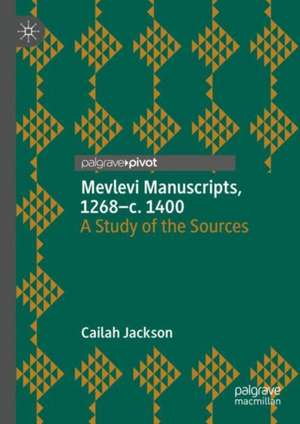Mevlevi Manuscripts, 1268–c. 1400: A Study of the Sources
Autor Cailah Jacksonen Limba Engleză Hardback – 3 mai 2024
Preț: 319.59 lei
Nou
Puncte Express: 479
Preț estimativ în valută:
61.15€ • 63.85$ • 50.61£
61.15€ • 63.85$ • 50.61£
Carte tipărită la comandă
Livrare economică 04-18 aprilie
Preluare comenzi: 021 569.72.76
Specificații
ISBN-13: 9783031483660
ISBN-10: 3031483669
Ilustrații: XVII, 160 p. 10 illus.
Dimensiuni: 148 x 210 mm
Greutate: 0.37 kg
Ediția:2024
Editura: Springer Nature Switzerland
Colecția Springer
Locul publicării:Cham, Switzerland
ISBN-10: 3031483669
Ilustrații: XVII, 160 p. 10 illus.
Dimensiuni: 148 x 210 mm
Greutate: 0.37 kg
Ediția:2024
Editura: Springer Nature Switzerland
Colecția Springer
Locul publicării:Cham, Switzerland
Cuprins
1 Introduction.- 2 The Manuscript Sources.- 3 Texts and Intellectual Interests.- 4 Scribes, Patrons and Readers.- 5 Locations of Manuscript Production.- 6 Conclusion.- 7 Appendices.
Notă biografică
Cailah Jackson is a Research Associate of the Khalili Research Centre, University of Oxford and former Junior Research Fellow at Wolfson College, University of Oxford and the Oxford Centre for Islamic Studies.
Textul de pe ultima copertă
“This important study of Mevlevi manuscripts is an outstanding piece of scholarship, based on a close examination of numerous often neglected manuscript sources. It sheds new light not just on the manuscripts themselves, but also the early Mevlevi community – its artists, artisans, and patrons, and their intellectual interests. It makes a significant contribution both to art historical scholarship and to the growing field of Islamic manuscript studies, and will be required reading for anyone interested in medieval Anatolia or Sufism.”—Professor A. C. S. Peacock, University of St Andrews, UK
This book provides a detailed and carefully researched catalogue of over 140 manuscripts related to the Mevlevi Sufis in their formative period during the thirteenth and fourteenth centuries. It also offers an in-depth and rigorous analysis of the manuscript material, which reveals much about the role of manuscripts in early Mevlevi life, the identity of disciples who were scribes and manuscript owners, and the geographical spread of the Sufi group. The Mevlevi Sufis were one of the most important and prominent socio-religious groups to emerge in late medieval Anatolia, following the Mongol conquests of the 1240s. Sometimes known colloquially as the ‘whirling dervishes,’ the Mevlevis became particularly powerful under Ottoman rule in the early modern period, even counting some sultans as their disciples. However, there is still much to learn about their earliest days, following the death of their ‘patron saint’ Jalal al-Din Rumi in 1273. Rumi is of course also notable as the author of the Masnavi, an extensive work of Sufi poetry written in rhyming couplets that is the core of Mevlevi ritual and learning. Beyond Mevlevi circles, Rumi remains very popular today as a ‘mystic’ poet. This study sheds new light on the intellectual culture of his time.
Cailah Jackson is a Research Associate of the Khalili Research Centre, University of Oxford and former Junior Research Fellow at Wolfson College, University of Oxford and the Oxford Centre for Islamic Studies.
This book provides a detailed and carefully researched catalogue of over 140 manuscripts related to the Mevlevi Sufis in their formative period during the thirteenth and fourteenth centuries. It also offers an in-depth and rigorous analysis of the manuscript material, which reveals much about the role of manuscripts in early Mevlevi life, the identity of disciples who were scribes and manuscript owners, and the geographical spread of the Sufi group. The Mevlevi Sufis were one of the most important and prominent socio-religious groups to emerge in late medieval Anatolia, following the Mongol conquests of the 1240s. Sometimes known colloquially as the ‘whirling dervishes,’ the Mevlevis became particularly powerful under Ottoman rule in the early modern period, even counting some sultans as their disciples. However, there is still much to learn about their earliest days, following the death of their ‘patron saint’ Jalal al-Din Rumi in 1273. Rumi is of course also notable as the author of the Masnavi, an extensive work of Sufi poetry written in rhyming couplets that is the core of Mevlevi ritual and learning. Beyond Mevlevi circles, Rumi remains very popular today as a ‘mystic’ poet. This study sheds new light on the intellectual culture of his time.
Cailah Jackson is a Research Associate of the Khalili Research Centre, University of Oxford and former Junior Research Fellow at Wolfson College, University of Oxford and the Oxford Centre for Islamic Studies.
Caracteristici
A thorough investigation of over 140 manuscripts related to the study of Rumi and the Mevlevis in the medieval period Examines Mevlevi intellectual interests and scribal culture Includes a detailed and updated list of the manuscripts
